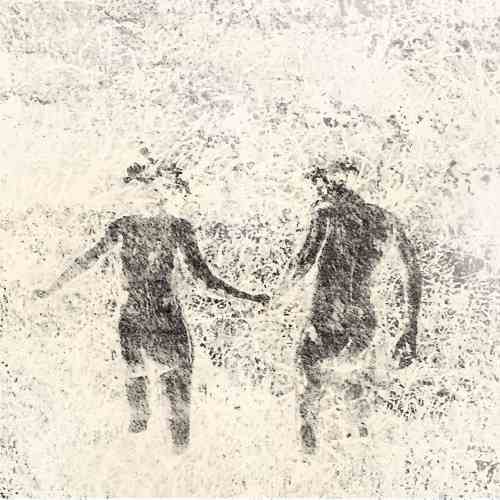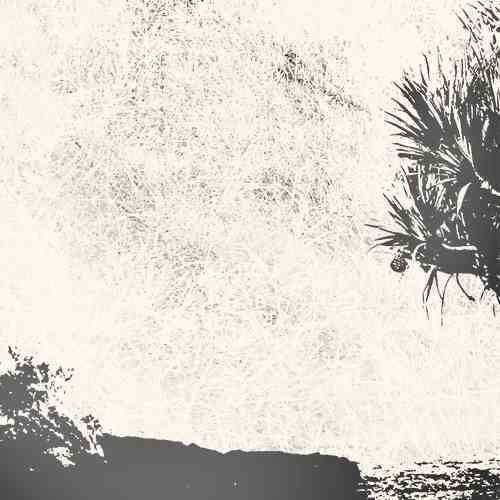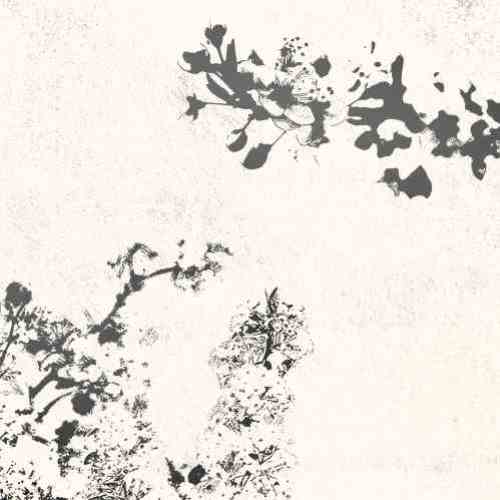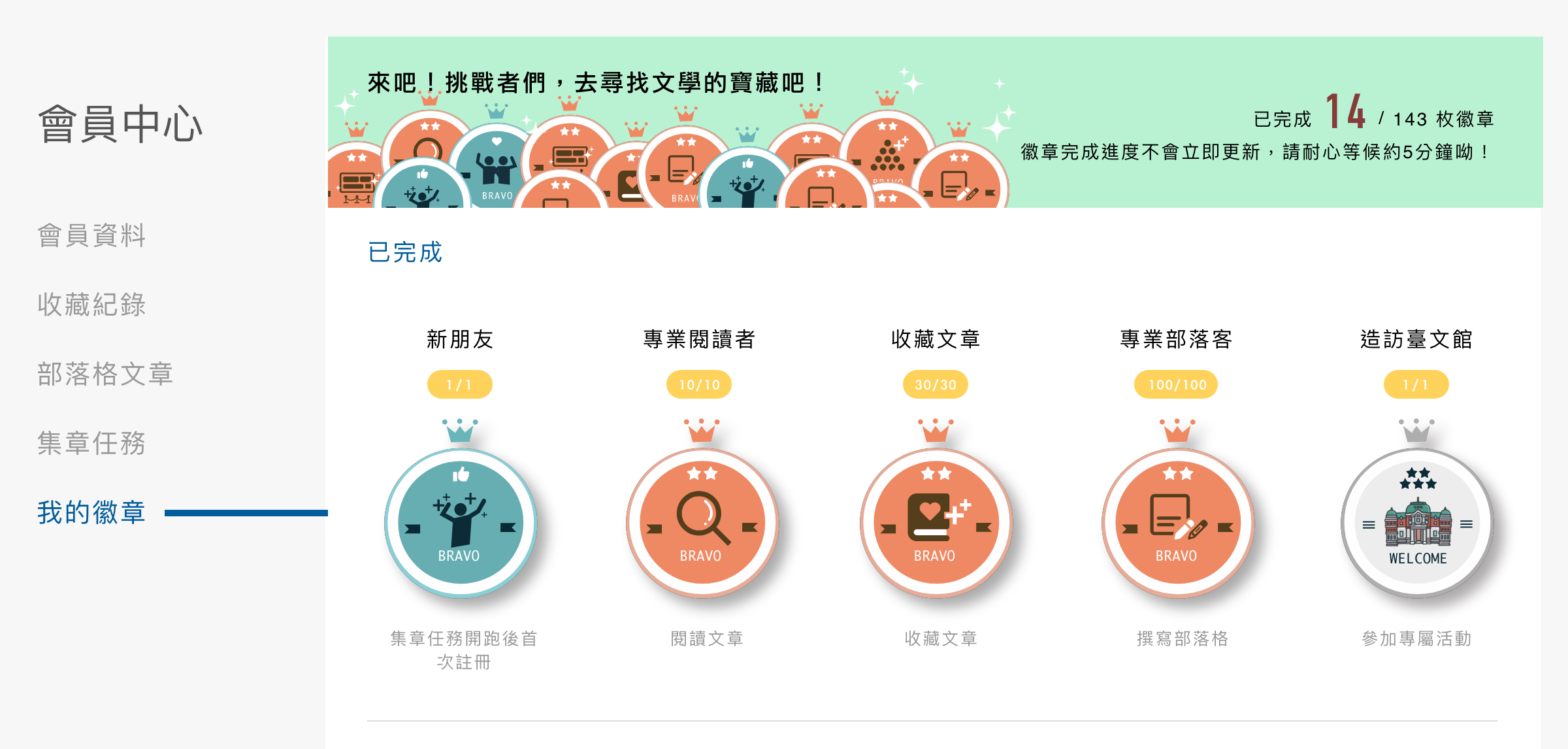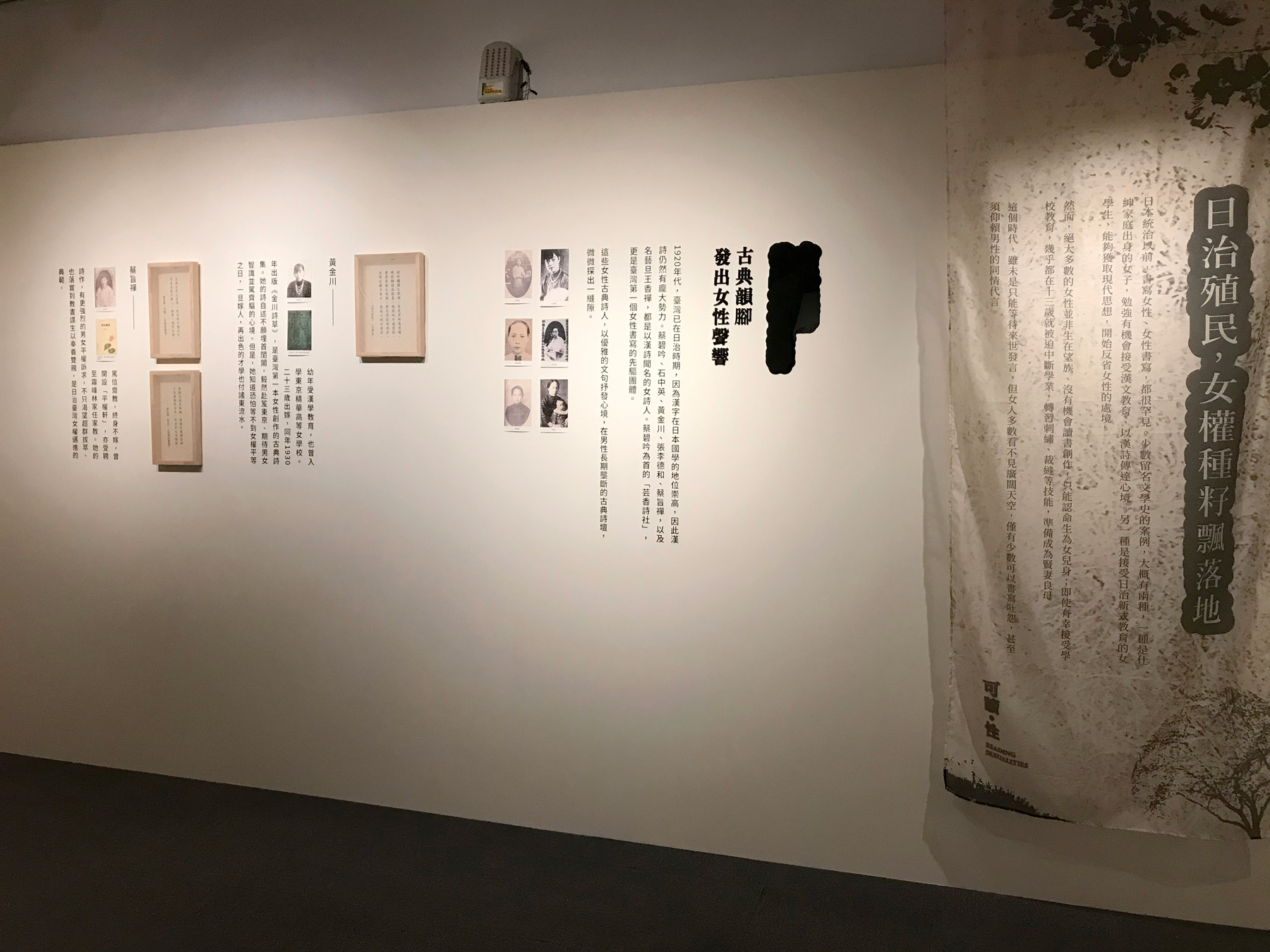
Women's Voices Were Reflected in the Rhymes of Classic Poems|The Theme of Fighting for Love Appeared in the New Literature|Male Writers Voiced Support for Women's Rights from Time to Time|Guide to Female Power
Literature on women and women's literature were rare before the Japanese Colonial Period. However, when Taiwan was under the Japanese rule, there were two kinds of women's writings that left their marks in the history of literature. One of these were penned by women in the gentry class, who were still able to receive education in Chinese and learn to convey their feelings through Chinese poetry. The other was penned by female students who used their literary abilities to reflect on the situation of women after being exposed to modern ideas through the new-style education.
However, most women were not born into the gentry class and had no means of receiving education or engaging in literary writing. They could only accept their traditional roles as women. Even though some were able to receive education, they were often forced to quit school during their early teens to learn embroidery and sewing and to prepare themselves to become competent wives and mothers.
Though progress was seen in this era, women were still heavily restricted, and only a few were able to write about their plight. They even had to rely on the sympathetic writings of male authors to express themselves.
Women's Voices Were Reflected in the Rhymes of Classic Poems
During the 1920s, Taiwan was still under the Japanese rule, and written Chinese was highly valued in Japan's Kokugaku (academic movement). Thus, Chinese poems were influential. Tsai Bi-yin, Shi Zhong-ying, Huang Chin-chuan, Zhang Li De-he, Tsai Chih-chan, and famous sing-song girl Wang Xiang-chan, were all female poets famous for their Chinese poems. Furthermore, Yun Hsiang Poetry Society, led by Tsai Bi-yin, was a pioneering organization in women's literature.
These female classical poets expressed their feelings with elegant words and gained a modicum of visibility in the classical poetry scene, which had been long dominated by men.
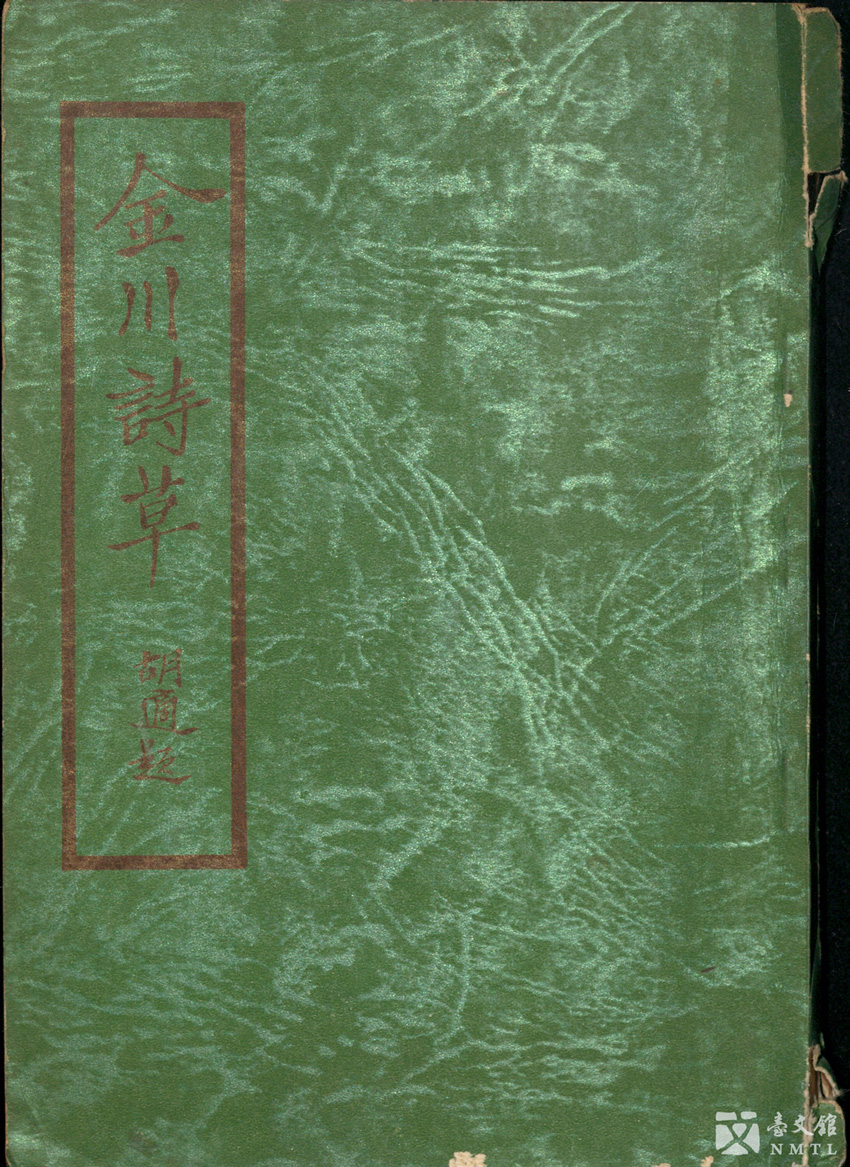
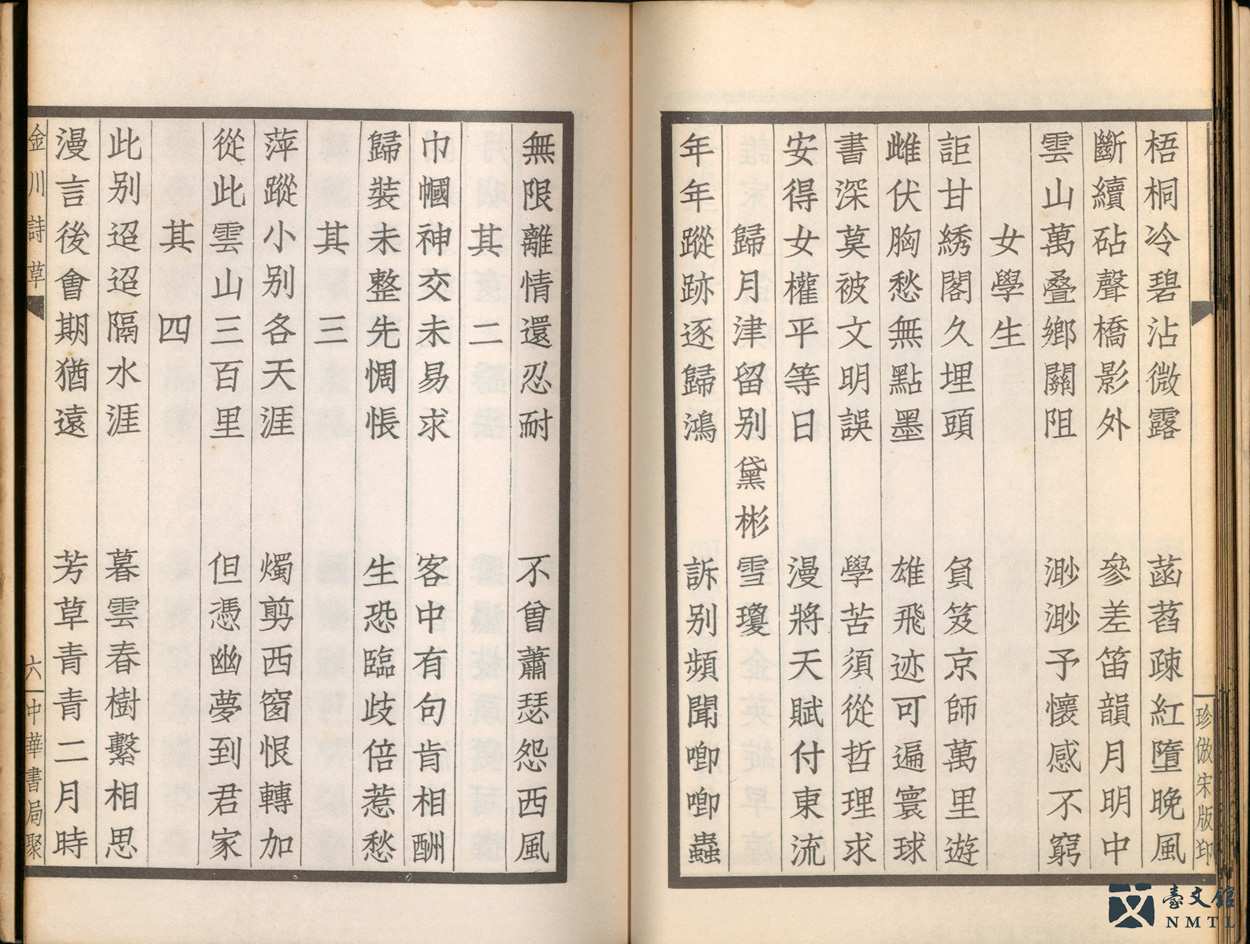
► CHINCHUAN POETRY COLLECTION
Poet Huang Chin-chuan's work. One of the poems, Female Student, describes the poet's ambitions and how her future is still limited because she is a woman. This is a reprint from 1981. The first version was printed in 1930 by Shanghai Chunghwa Bookstore. It was the first poetry collection written by a Taiwanese female poet. The book contains poems made when the poet was between 18 and 23 years old. There are 237 poems in total. (Donated by Yeh Shih-tao / From the National Museum of Taiwan Literature permanent collection)

Women are starting to be seen and they will not tolerate living a life of mediocrity;
I hope to fly up in the sky like a giant bird and soar across that rainbow with my head held high.
──Tsai Chih-chan, "Ambition," CHIH-CHAN'S POEMS AND PAINTINGS.
⁍ Tsai Chih-chan was a firm believer in the Chinese religious practice of fasting. She never married and was the founder of Equality Library. She was once hired as a tutor by the Lin family in Wufeng. Her poems strongly advocate gender equality. She not only aspired to stand out from others, but also supported her parents by working as a teacher. She was a great example of the improved women's right situation during the Japanese Colonial Period.
The Theme of Fighting for Love Appeared in the New Literature
The 1920s was a time when Japan and its colonies enjoyed a relatively more liberal cultural atmosphere. "New Women" began to appear in Taiwan. This trend of liberal thinking was put into action in the "natural feet movement." With respect to economic participation, there were "modern women" who went out to work. In the meantime, Taiwan's Government-General launched vocational education policies aimed at training "competent wives and mothers for the Japanese Empire." The policy eventually instilled Taiwanese women with modern ideas and nurtured "women of the new literature" who could read and write. Some of these women even openly challenged time-honored misogynistic traditions and norms. For instance, in 1926, the Women's Organization of Changhua published an article encouraging women to pursue love. However, the article was condemned for its indecency and derided by its detractors as the libertine "Free Love Incident."
Male privilege was no longer unquestioned. In 1930, Taiwan entered the "dancing era," which was marked by cultural breakthroughs. The first wave of New Women included many exceptionally talented and passionate women. Several shining examples include critic Yeh Tao, Huang Bao-tao, Xie Yu-ye, musician Lin Hao, pianist Kao Chih-mei, journalist Yang Chien-he, and writer Huang Feng-tzu.
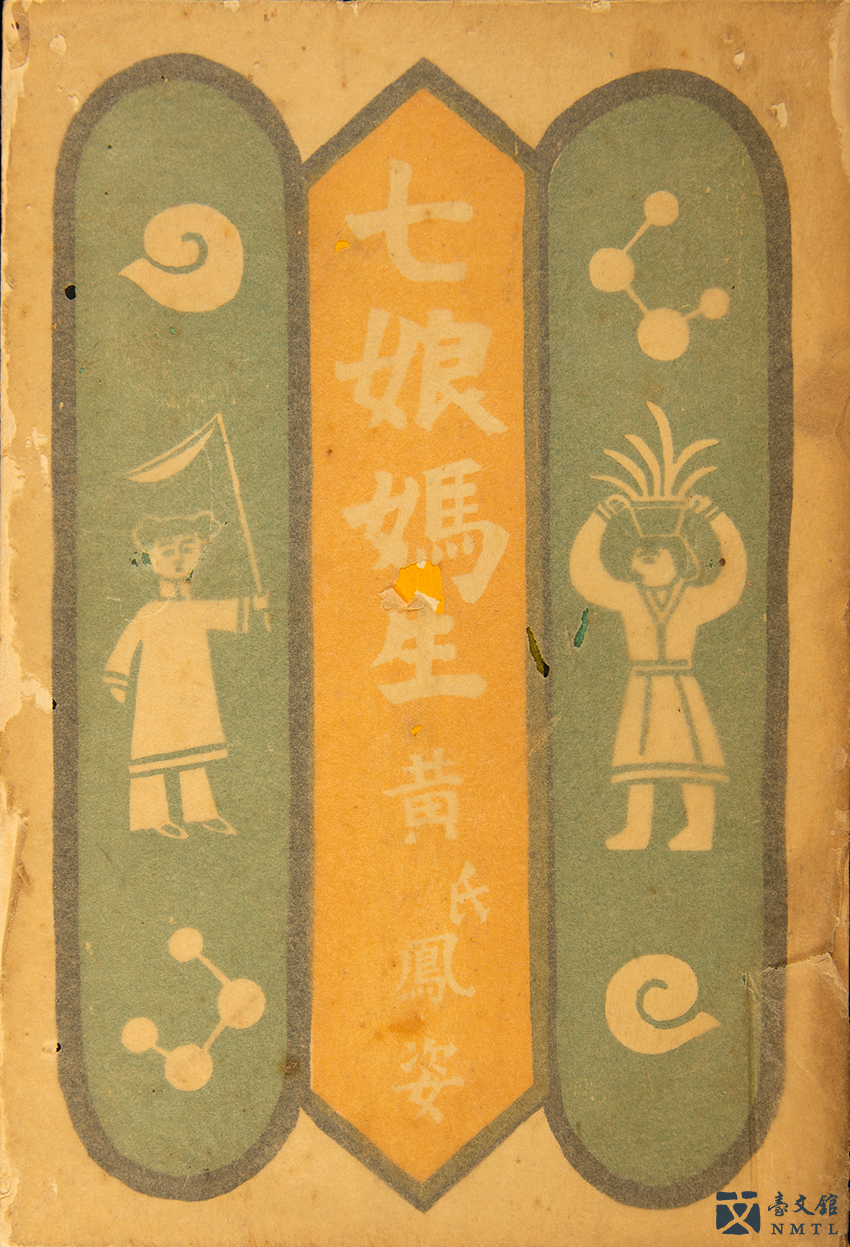
► BIRTHDAY OF THE SEVEN STAR GODDESS
Huang Feng-tzu's first work at the age of 12 features many narratives on Taiwanese customs. It was edited and coordinated by her teacher Toshio Ikeda in 1940. Mitsuru Nishikawa contributed the foreword and Tetsuomi Tateishi took charge of the book design. It was published by Touto Publishing Company Taipei Branch. The vivid and playful cover and illustrations were made by Huang's classmate, Chen Feng-lan. (Donated by Wu Yong Fu Foundation / From the National Museum of Taiwan Literature permanent collection)
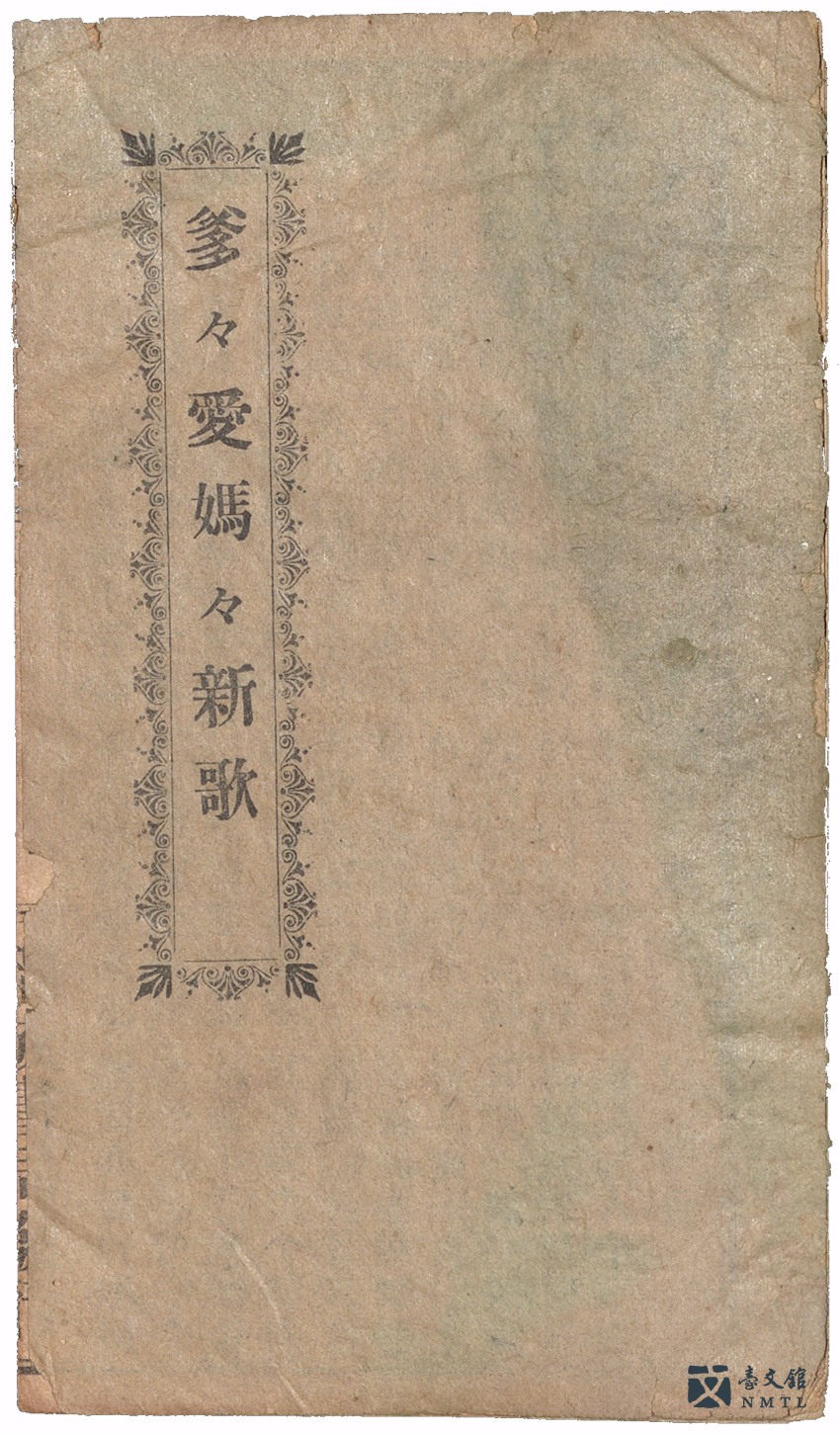
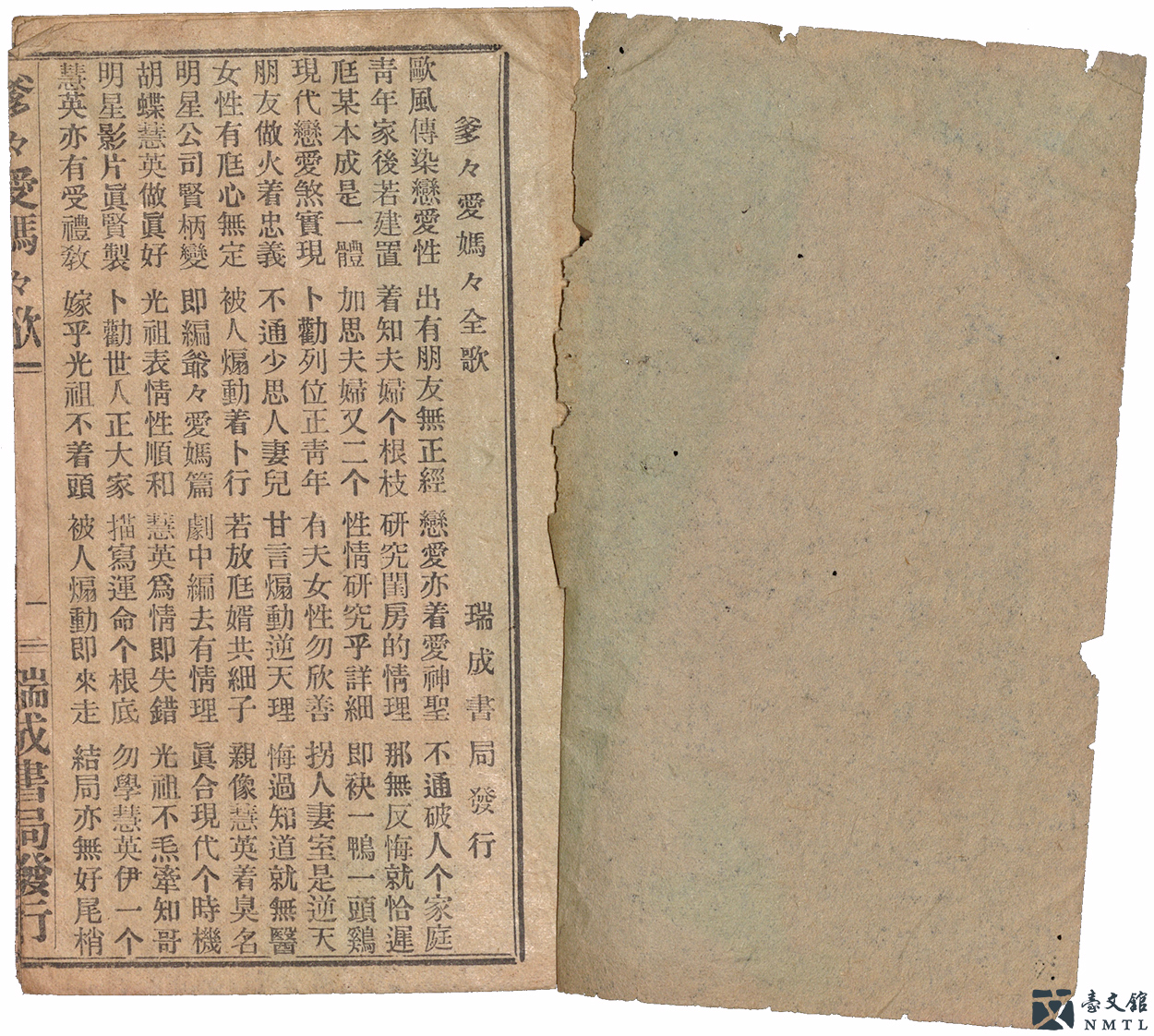
► DADDY LOVES MUMMY: NEW SONGS
A koa-á book published by Ruicheng Bookstore in Taichung in 1933. The author was Xu Bohu. It was published earlier than NEW SONGS OF CANAL TRAGEDY and SONGS OF MARRIAGE REVOLUTION. The song book manifests a conservative attitude towards the widespread defiance of arranged marriages among young people at the time and the corresponding social phenomena, admonishing young people against the pursuit of romantic love. (Donated by Huang De-shi / From the National Museum of Taiwan Literature permanent collection)
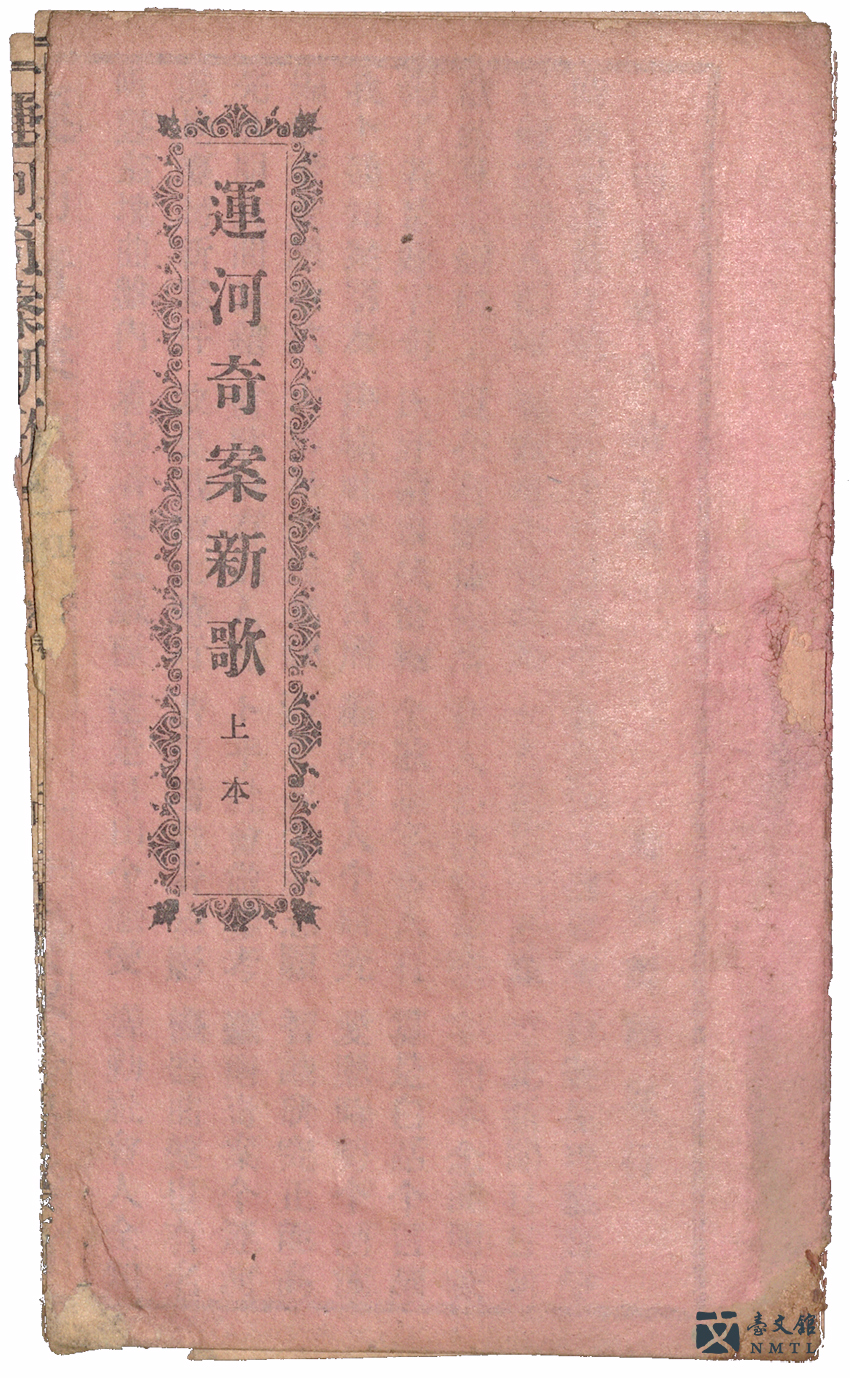
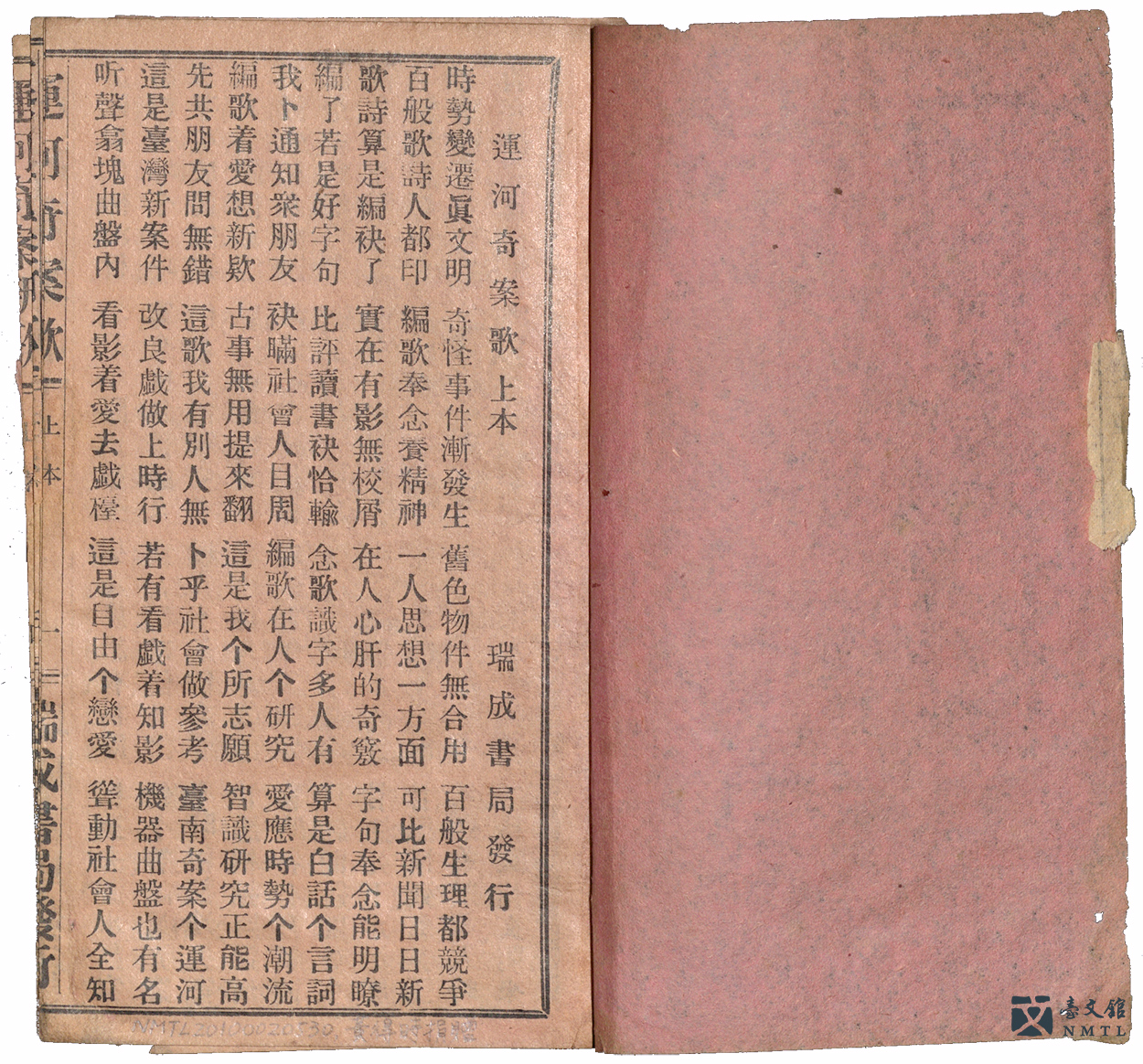
► NEW SONGS OF CANAL TRAGEDY (First Part)
A koa-á book (vernacular literature) published by Ruicheng Bookstore in Taichung in 1935. It tells a story of two lovers committing suicide in a canal in Tainan during the Japanese Colonial Period. The book was adapted into multiple versions of song books and operas. The story tells of a tragedy involving sing-song girls, adopted daughters, and traditional marriage, forcing society to reexamine the folk customs. (Donated by Huang De-shi / From the National Museum of Taiwan Literature permanent collection)
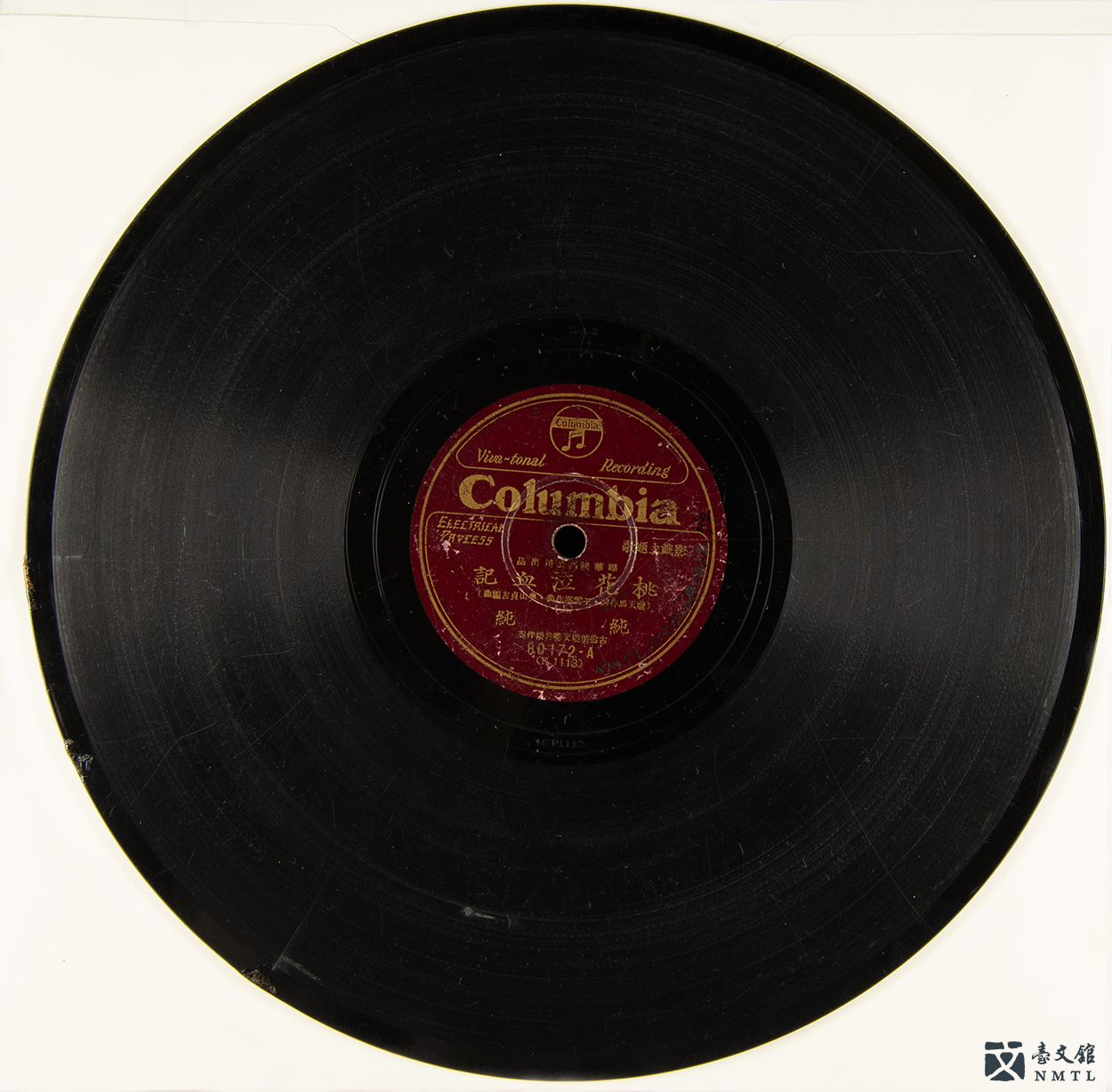
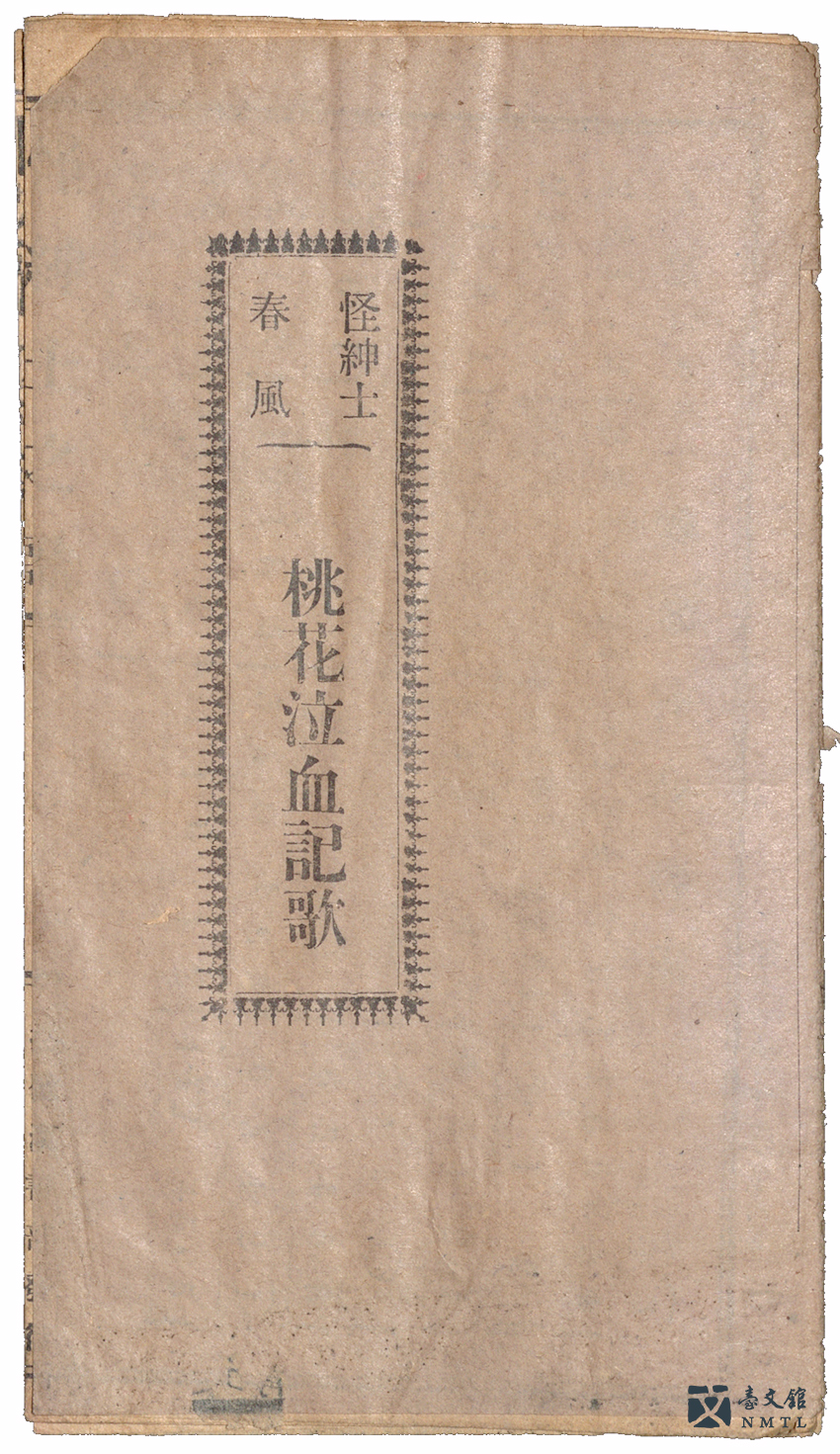
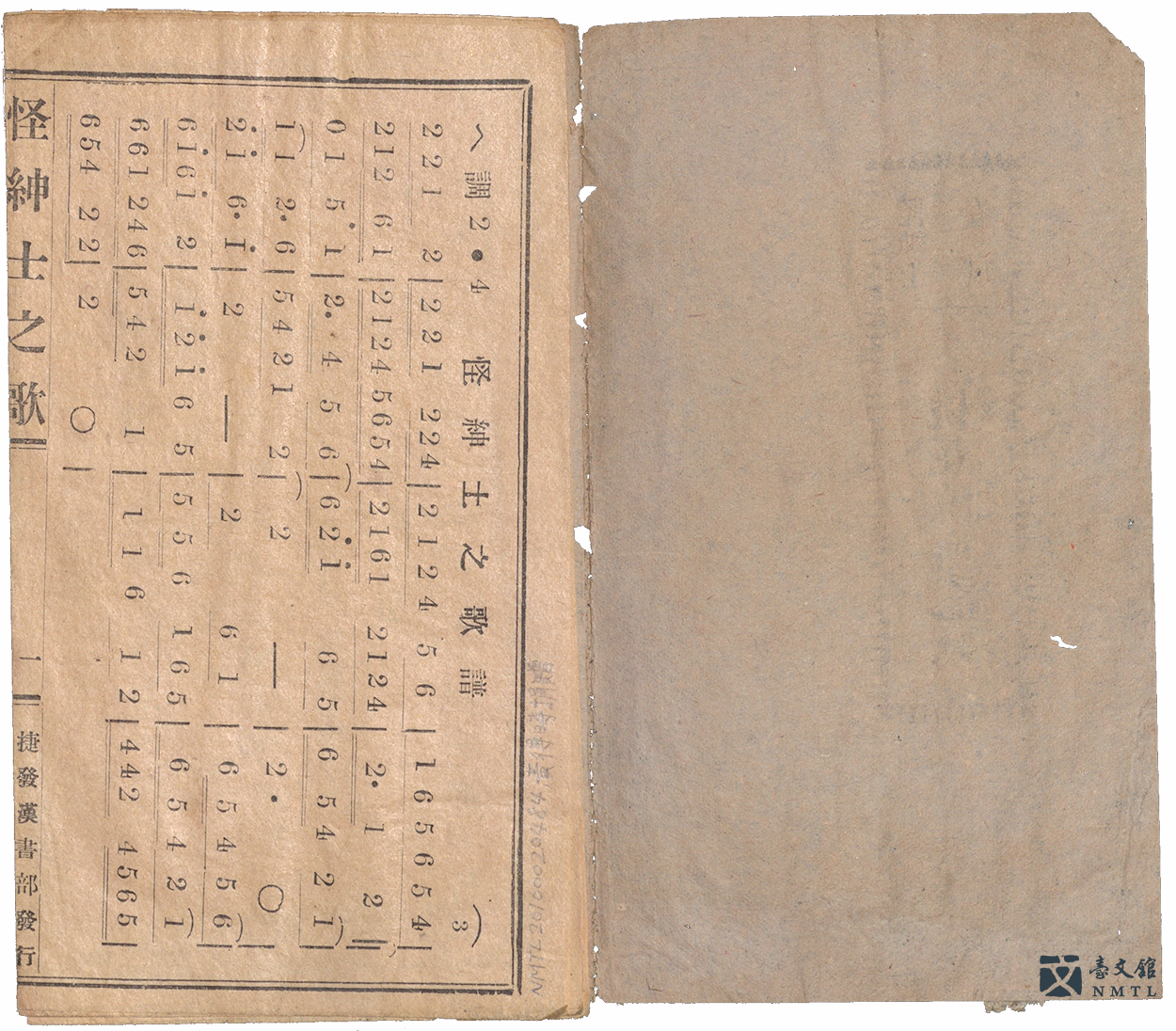
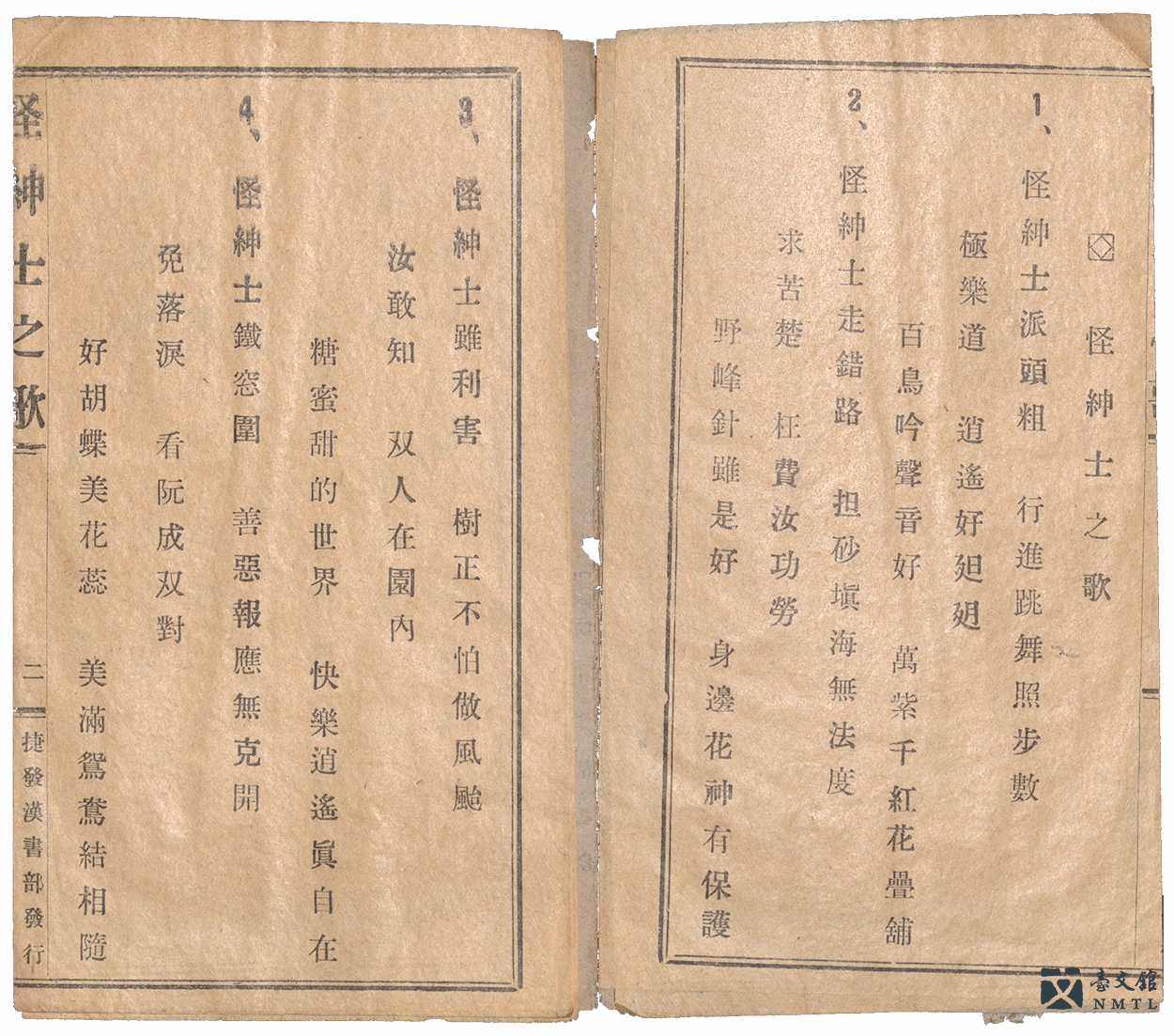
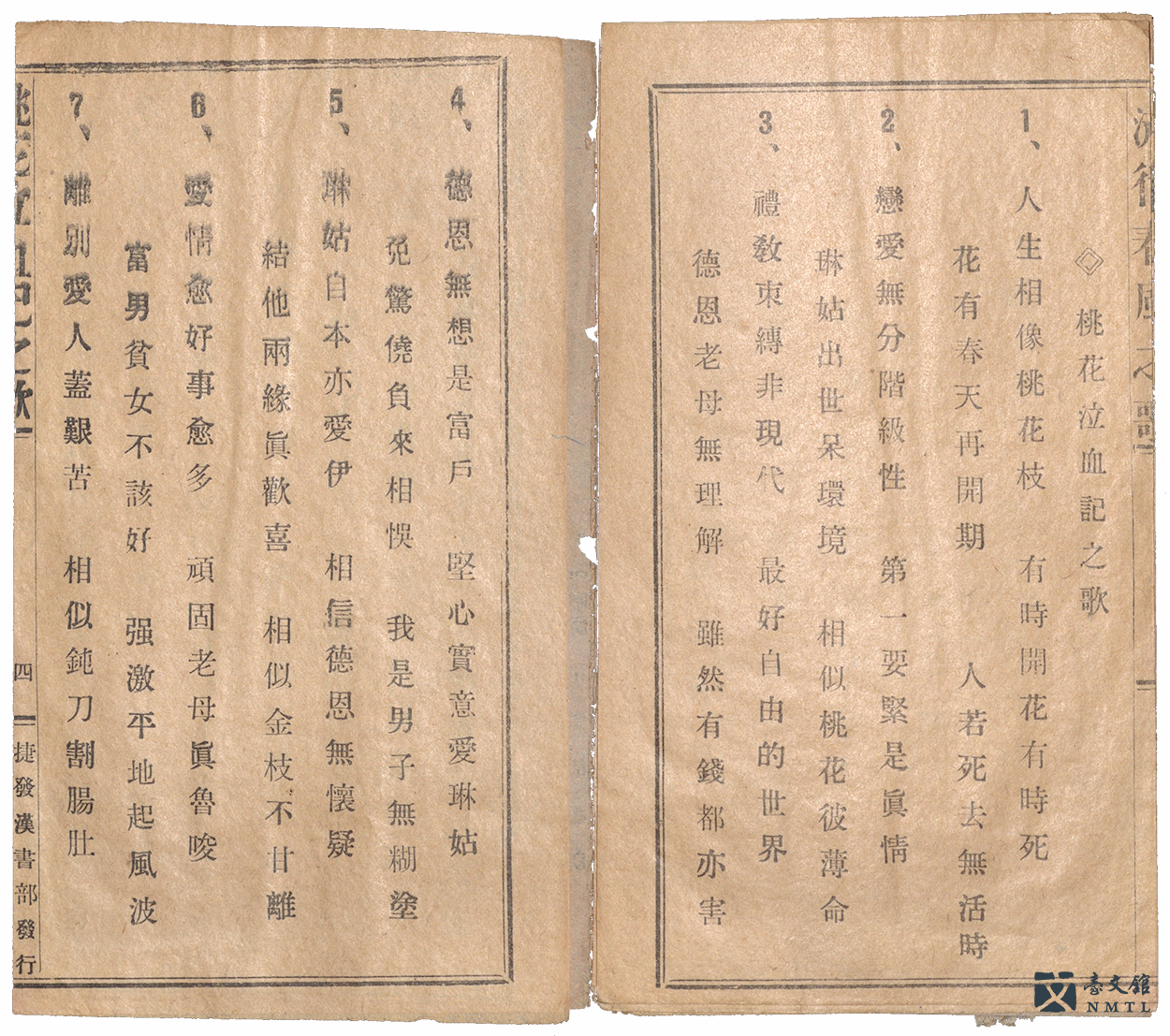
► THE PEACH GIRL Vinyl Record and Lyrics Book
THE PEACH GIRL was released in cinemas in Taiwan in 1932. A promotional song of the same name that celebrated the fight for love was produced at the time. The lyrics were written by Jhan Tian-ma and the song was written by Wang Yun-feng. It was sung by Chun Chun and was recorded and released by Columbia Records. The song book was published in 1934 by Jiefa Publishing Company, which also contained STRANGE GENTLEMAN, a song from a movie of the same name in 1933, and "Spring Wind." (Donated by Hsu Teng-feng & Huang De-shi / From the National Museum of Taiwan Literature permanent collection)
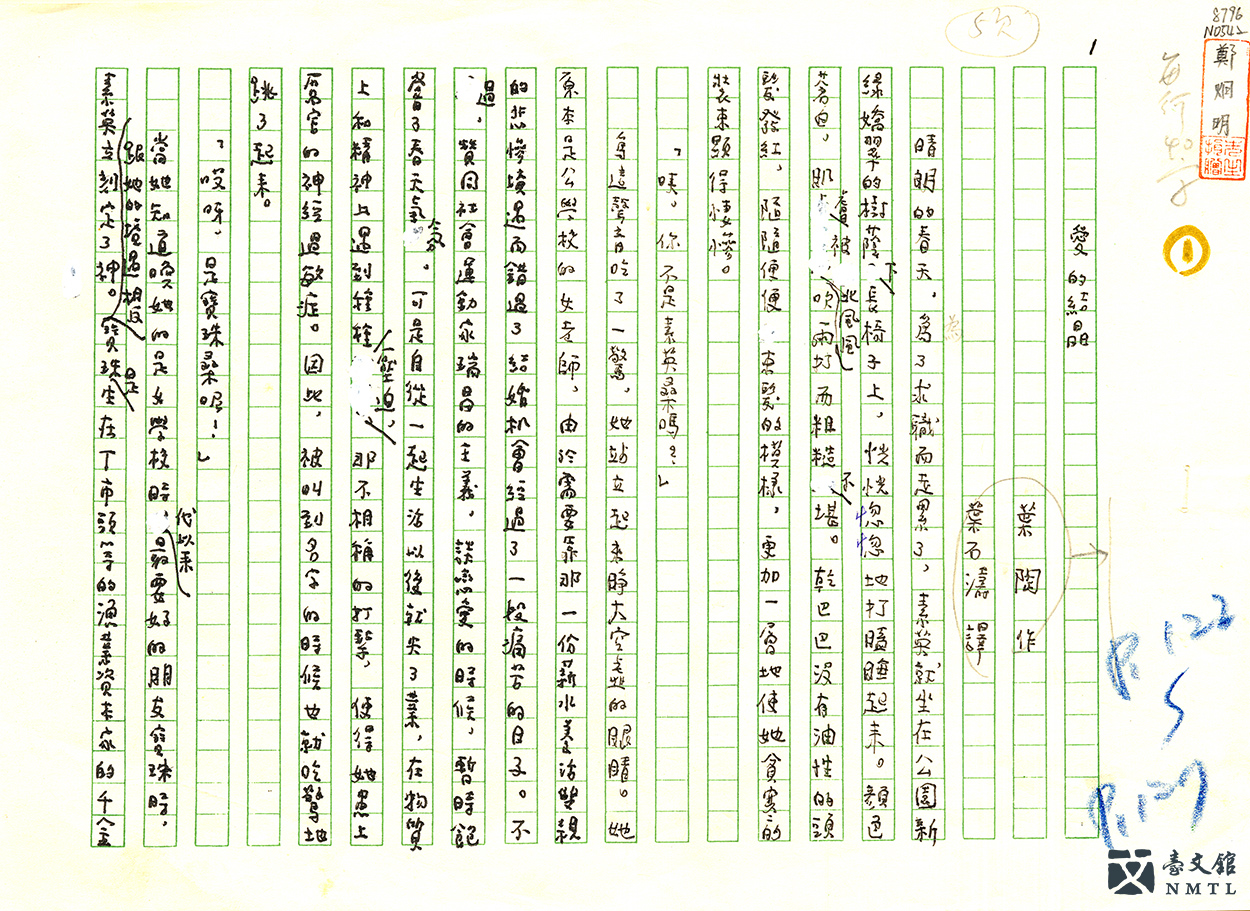
► Translation manuscript of "A Labor of Love"
Yeh Tao's short novel. This manuscript is the translation by Yeh Shih-tao in 1996. The original work was published in the auxiliary publication of TAIWAN NEW LITERATURE: NEW LITERATURE MONTHLY. The plot is based on actual events, and the night blindness symbolizes ideals that are swallowed by the darkness. In the end, two wounded women from different classes comfort each other, indicating that the public should work together to overcome obstacles. (Donated by Literary Taiwan Magazine / From the National Museum of Taiwan Literature permanent collection)

Graduation and marriage seemed to be separated by a thin wall when we were young. Within less than a year, several classmates had already given out their wedding candy and wedding invitations at school. I have gone to two weddings held at Peng Lai Ge. If I have calculated it correctly, half of the students in my class are married. They were quite keen on preparing to get married while still in school. Although I understand they were pursuing their personal happiness, I still think they were a bit too naïve. (Perhaps some people will criticize me for saying this, but this is just how I feel). The fact that they got married so easily makes me feel that there is something missing.
After a woman is born into the world, she will go through an innocent childhood, and then she will have to study endlessly at one school after another. Before she can even take a break, she will find herself married and then have children… Not long after, she will die of old age. During this whole process, can she really let her life be decided by fate and discard her own will and emotions?
──Yang Chien-he, "The Time When Flowers Blossom," 1942.
⁍ Yang Chien-he was the first female journalist in Taiwan. In 1941, she worked for TAIWAN DAILY NEWS. In 1942, she quit her job and wrote THE TIME WHEN FLOWERS BLOSSOM, which was the first female coming-of-age novel in Taiwan. The protagonist Huiyin, just graduating from school, is unwilling to sit around and wait to get married like her other classmates. However, she realizes the piano, tailoring, and cooking lessons she has taken at school are all for bride training. Thus, she begins to contemplate the meaning of a woman's life. She later goes to work for a newspaper despite her family questioning her decision. THE TIME WHEN FLOWERS BLOSSOM is a near-autobiography of Yang Chien-he, as well as an enlightened manifesto on women's rights in Taiwan.
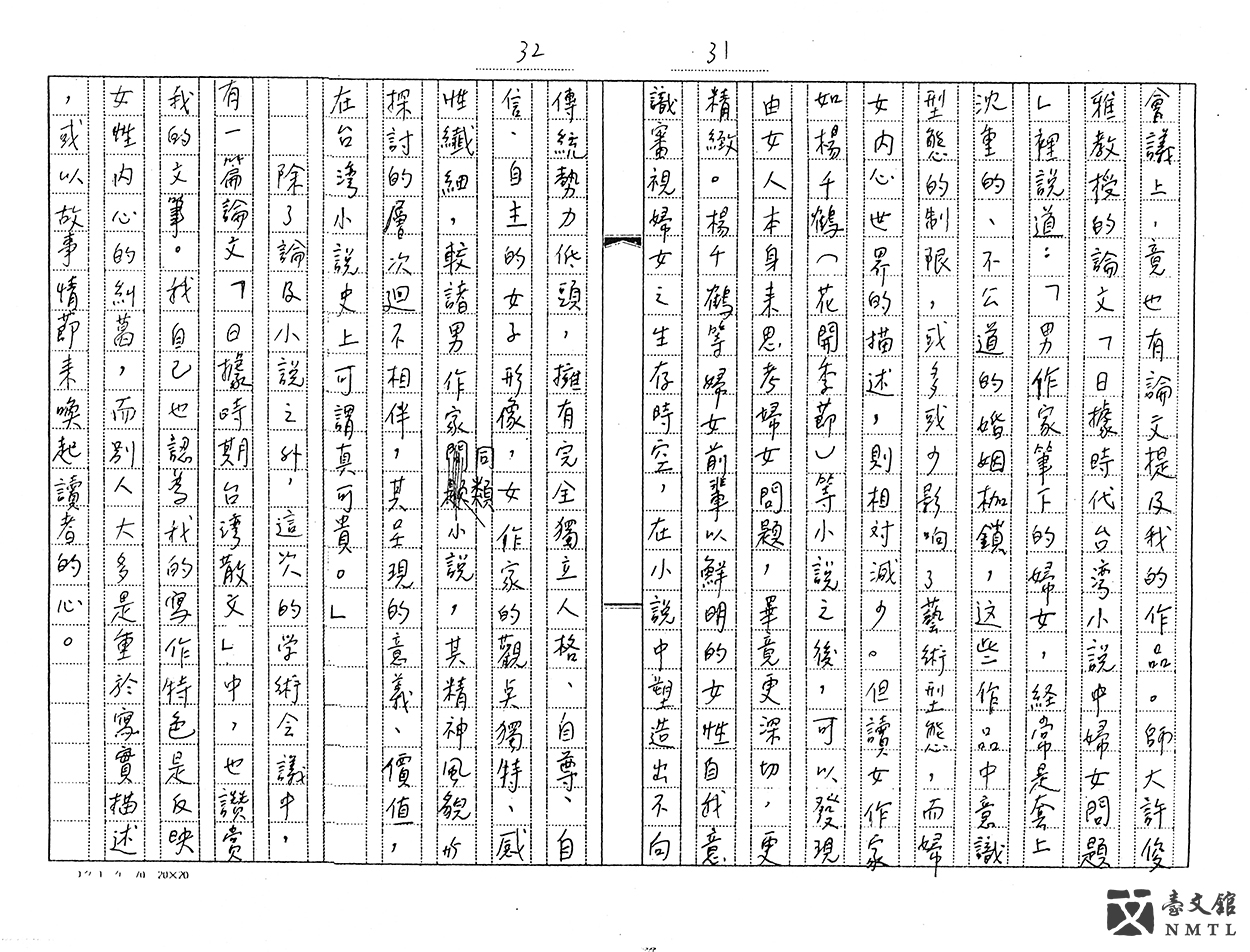
► Manuscript of "My Thoughts on Taiwanese Literature During The Japanese Colonial Period"
Yang Chien-he's manuscript for her speech in 1995. It was also published in the 16th issue of LITERATURE TAIWAN. It was one of the few articles written from a female writer's perspective on Taiwanese literature during the Japanese Colonial Period. The article also mentions writings on female-related topics. The author claims that her writing style reflects the inner struggle of women, which differs from male writers' realistic portrayals restricted by ideologies. (Donated by Literary Taiwan Magazine / From the National Museum of Taiwan Literature permanent collection)
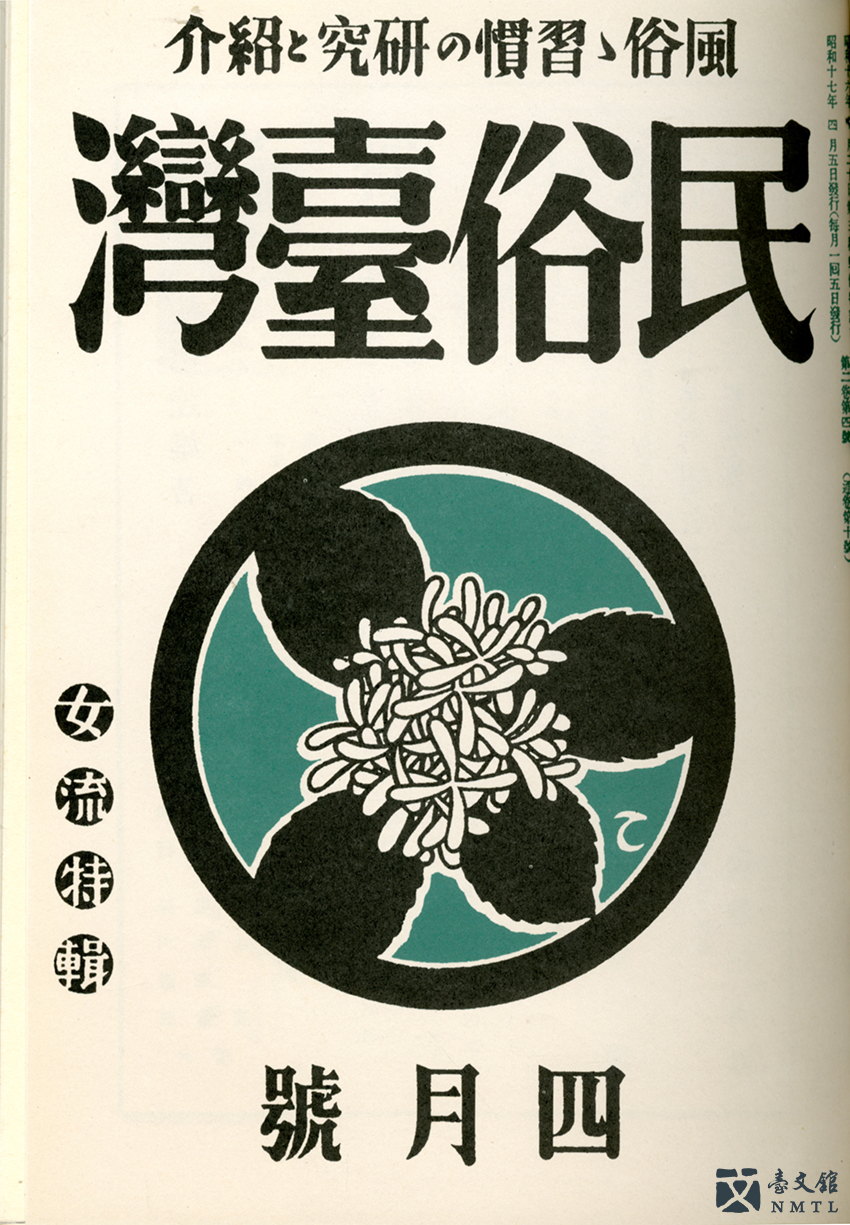
► FOLK TAIWAN, Issue 4, Vol.2
Published in 1942. It was coordinated by anthropologist Takeo Kanaseki. This issue features a special collection of works by female writers, including Chang Mei-hwei, Yurik Fukuda, Yang Chien-he, Huang Feng-tzu, and Xu Qing-juan. The topics include Taiwanese girls, Taiwanese women, hair accessories, clothing, cooking, and family life. (Donated by Long Ying-zhong / From the National Museum of Taiwan Literature permanent collection)
Male Writers Voiced Support for Women's Rights from Time to Time
In the later stage of the Japanese Colonial Period, Taiwanese male intellectuals mostly paid attention to colonial and class issues. However, some noted the disadvantaged status of women. Peng Hua-ying, Huang Chien-Tsong, and Wang Min-chuan, all members of the Taiwan Cultural Association, wrote editorials published in the TAIWAN MINPAO newspaper and advocated for education for women as well as new gender relations.
In the literary world, many works empathized with the social plight of women. These included Loa Ho's "Sad That She's Dead," Yang Shou-yu's "Beggar Woman," Zhang Wen-huan's "Home of Sing-song Girls," and Wu Chuo-liu's "A Gold Carp in the Mud."
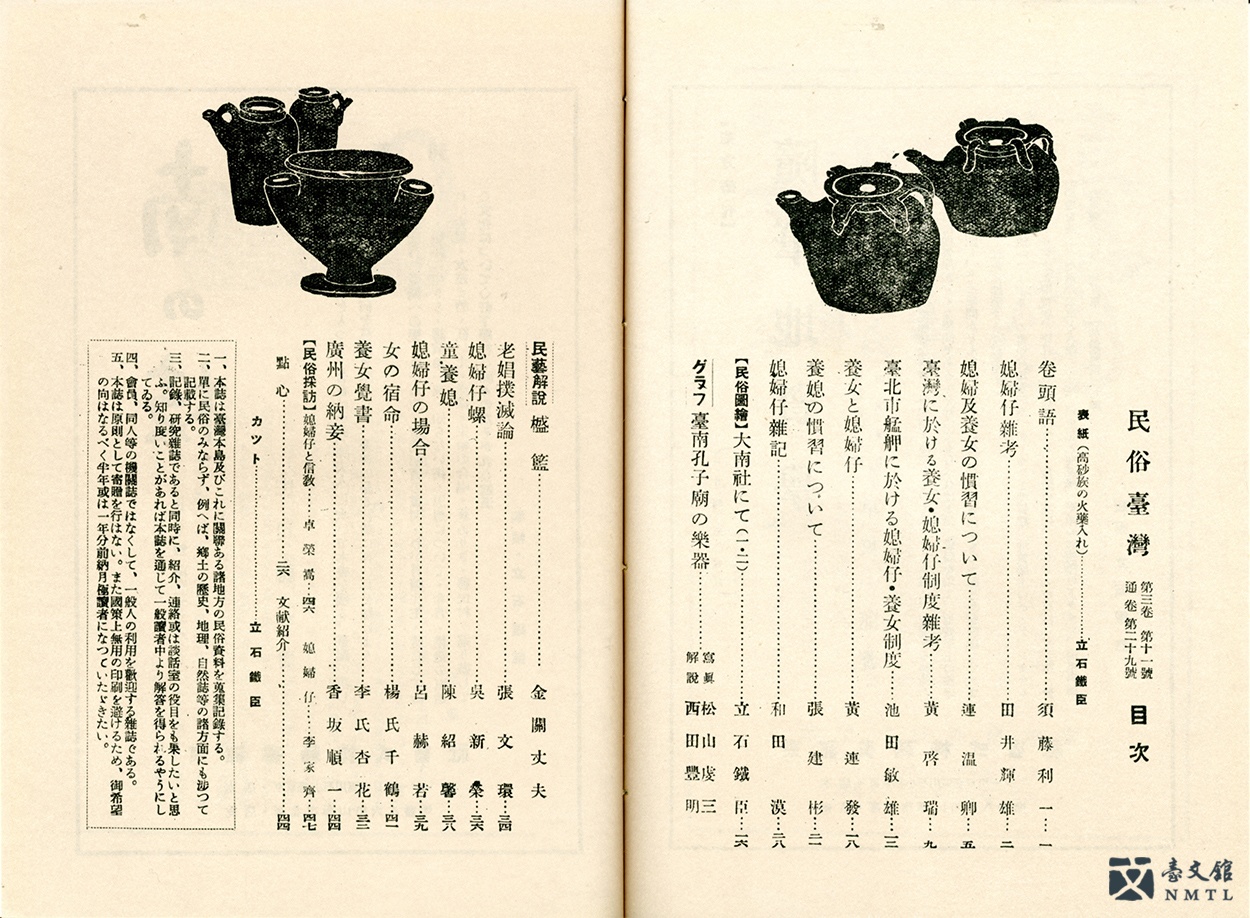
► FOLK TAIWAN, Issue 11, Vol.3
The editor of this issue was Japanese anthropologist Takeo Kanaseki. It was published in 1943. This issue deals with "adopted daughters-in-law" in Taiwan and examines folk culture and customs. It features Yang Chien-he's "Women's Destiny" and opinions and discussions on related customs by male writers such as Zhang Wen-huan, Wu Xin-rong, and Lu He-ruo. (Donated by Huang De-shi / From the National Museum of Taiwan Literature permanent collection)
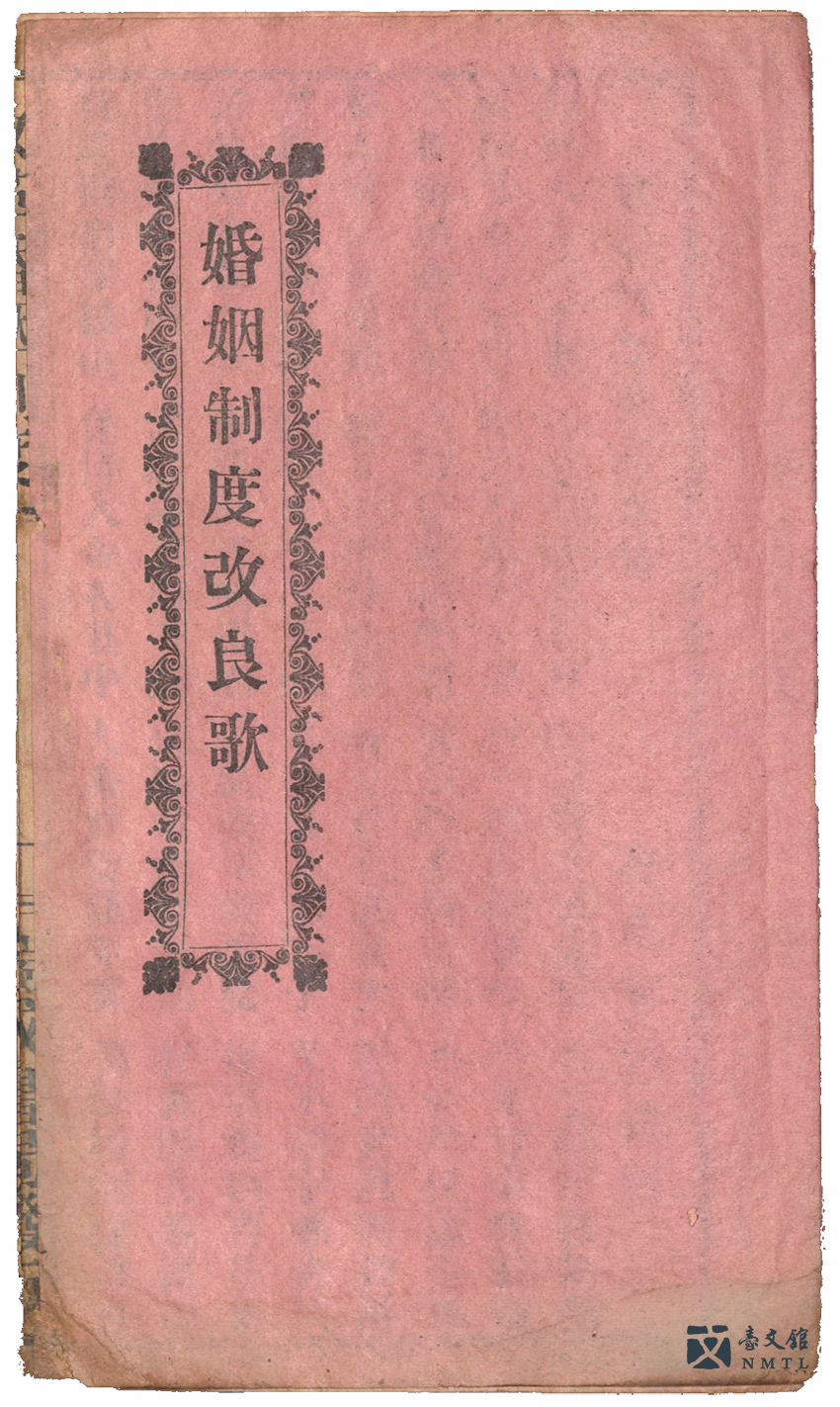
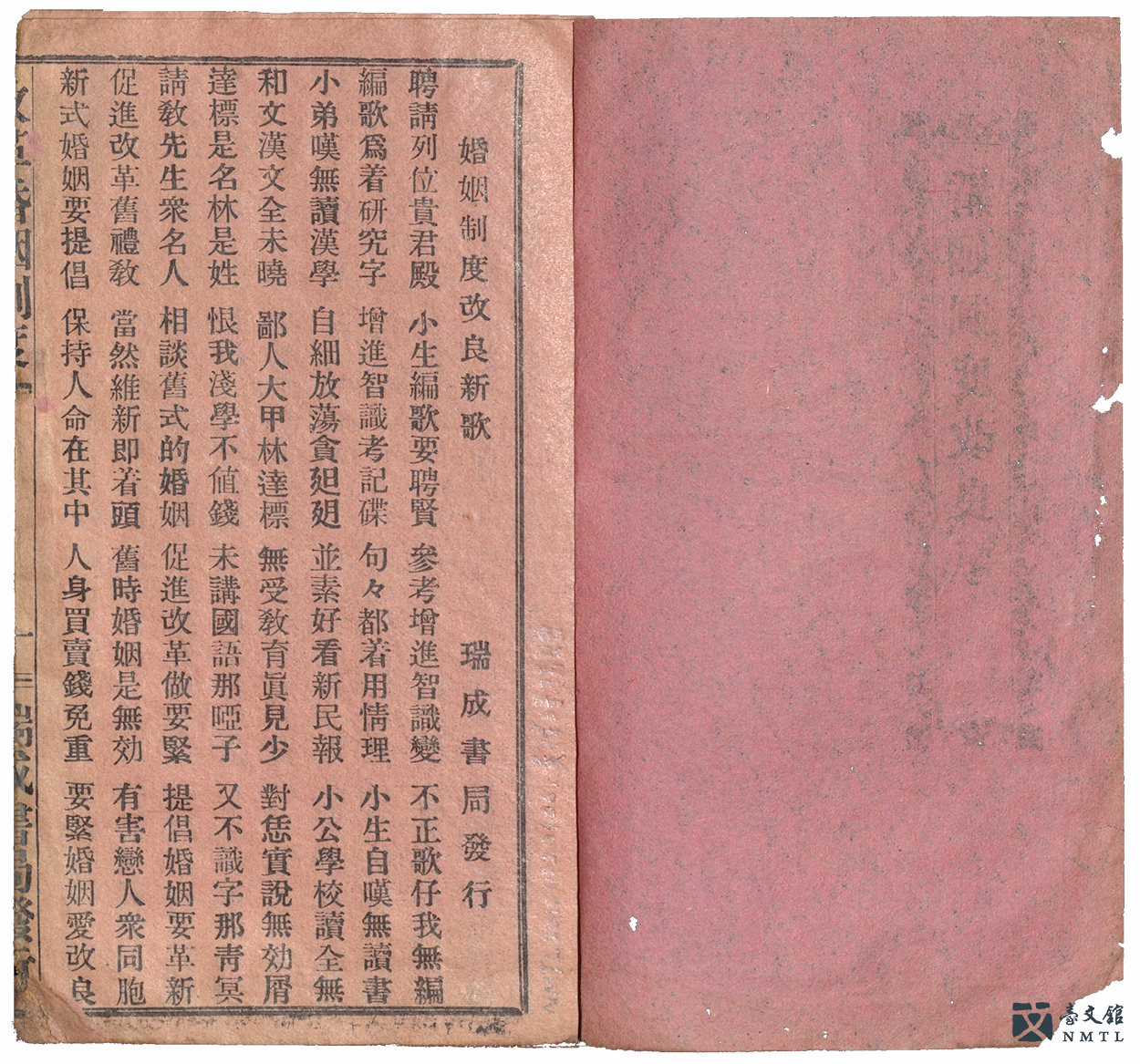
► SONGS OF MARRIAGE REVOLUTION
A koa-á book published by Ruicheng Bookstore in Taichung in 1935. The author was Lin Da-biao, a resident of Dajia. The first part of the book reads: "…marriages in the past harmed lovers. The new-style marriage puts emphasis on the lives of the people involved. Bride-wealth and dowry are not the most important things. The concept of marriage must be revolutionized…" The book criticizes the restrictions imposed by traditional marriages and old customs. (Donated by Huang De-shi / From the National Museum of Taiwan Literature permanent collection)

She had a sick husband, so she was forced to live like a widow. Being depressed for a long time, she was eager to see herself with makeup and yearned for others' attention. "Why can't I be loved by a man and love him back as well?"
…Yueli was like a man. She could work anywhere. Very soon, she talked like a man. As a result, men acted more daringly and joked around with her.
…Since she no longer cared about men, she also became less restrained. From another perspective, her desire to show her beauty in front of others emboldened her.
──Zhang Wen-huan "The Capon," 1942.
⁍ Zhang Wen-huan's "The Capon", written in 1942, features a female protagonist, Yueli, who has long taken care of her handicapped husband. She gradually breaks free from the shackles of morality. She begins to care about her appearance and craves for love. But her love is not blessed by people in her community. Eventually, she jumps into Bitan Pond and kills herself along with her lover. "The Capon" is a metaphor for the handicapped husband as well as a symbol of the corrupt and impotent patriarchal tradition. Although the novel has a tragic ending, it encouraged women to challenge contemporary taboos.
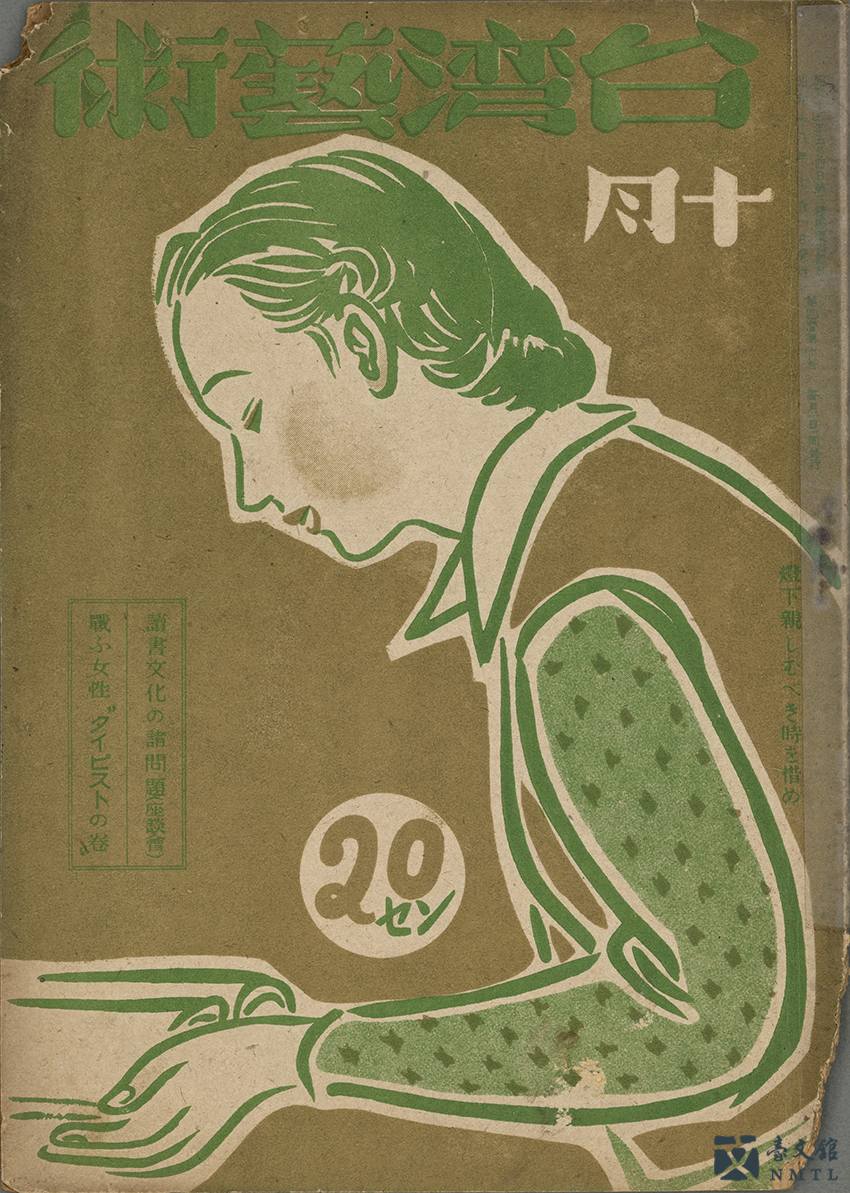
► TAIWAN ART, Issue 10, Vol.4
Published in 1943. This issue introduces women during the war and working women. There is also a review on Hosheng Theater's THE CAPON. The Japanese government imposed the National Mobilization Law in 1938, and Taiwan gradually entered the wartime period. Women's education and life were affected by military preparation, which could be seen in the publications at the time. (Donated by Long Ying-zhong / From the National Museum of Taiwan Literature permanent collection)

► Original Manuscript of "The Capon"
This is the Japanese revised manuscript of Zhang Wen-huan's short novel "The Capon." It was first published in TAIWAN LITERATURE (Issue 3, Vol. 2) in 1942, when Yang Chien-he's short novel "The Time When Flowers Blossom" was also published. In 1943, it was made into a stage play of the same name by Lin Tuan-Chiu. In September of the same year, Hosheng Theater Society performed the play for the first time at Taipei Yungle Theater. (Donated by Wu Yong Fu Foundation / From the National Museum of Taiwan Literature permanent collection)
∞ Guide to Female Power ∞
Tragedy in Canal: Chen Jin-kuai
In 1926, after Tainan Canal was opened to traffic, news about a singsong girl and her lover jumping into the canal and killing themselves broke out. The famous singsong girl Chen Jin Kuai and her boyfriend Wu Jieli's tragedy was adapted in various literary works, including the koa-á book NEW SONGS OF CANAL TRAGEDY. The 1956 movie LOVE TRAGEDY IN CANAL depicts Chen Jin-kuai's miserable life as an adopted daughter. It reflects the abhorrent tradition of human trafficking under the guise of adoption.
After the war, the systems of adopting daughters and arranged marriages still existed. After the 1950s, Provincial Councilor Lu Jin-hua and others initiated a movement to protect adopted daughters. Together with the popularization of compulsory education and economic growth, women in Taiwan finally were free, and their safety was officially protected.
◇ ◇ ◇
Voice That Created A New Era: Lin Hau
Lin Hau (1907-1991) was born in Tainan. She was a music teacher and a violinist. Her husband was the famous social activist, Lu Bing-ding. Lin Hau was also a pop singer. In 1932, she joined Columbia Records and sang her first song "Moonlight Melancholy." Later on, she also recorded famous songs such as "One Red Egg" and "Song of A Red Warbler." She joined the company later, and her unique bel canto style was different from the Taiwanese opera singing technique. Thus, she often provided lessons for singers later, including Chun Chun and Ai Ai. In 1935, she frequently worked with the first symphony orchestra in Taiwan, the You Zhong Orchestra, which was formed by Zheng You-zhong. After the war, she assisted her adopted daughter Lin Xiang-yun to found "Lin Xiang-yun Dance Society," which continued to promote music and art education in Taiwan.
◇ ◇ ◇
Free Love Incident: Changhua Women's Association
In 1925, with the support of the Taiwanese Cultural Association, several young women who had received new-style education founded the first women's organization in Taiwan, Changhua Women's Association. The organization aimed to promote women's rights through education for women. It also held the first event with women giving speeches. However, it was suppressed from the beginning and went though many difficulties.
In 1926, a member of Changhua Women's Association, in order to actualize her dream of freedom, tried to elope to Shanghai with the son of a local official in Changhua. Later on, her plan was exposed, and the four participating members of the association were captured. The incident was heavily criticized by the local conservative gentry, who described this event as "obscene." This led to a counterattack by members of the Taiwanese Cultural Association, which claimed that the incident was a fight for love. Both parties submitted more than 60 articles to the newspaper. The incident was later on known as the "Free Love Incident."
In the end, the Changhua Women's Association was forced to break up, indirectly encouraging other women's rights activists to found other women's organizations such as the Zhuluo Women's Association and Taichung Women's Association.
